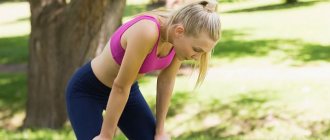Sleep is the best rest, a cure for many diseases. During sleep, the body's internal resources are restored, memory improves, and muscle mass increases. People who get enough sleep look better and get sick less.
Insomnia is a violation of the cyclicity of sleep, a failure of its pattern. The disorder manifests itself in different ways: difficulty falling asleep, waking up too early, waking up in the middle of the night. Insomnia can occur periodically or haunt a person constantly. With constant sleep disturbances, the body is deprived of normal rest. He does not have time to fully recover. Lack of sleep accumulates, it gradually undermines strength and undermines the immune system.
The causes of insomnia are different. Some of them are related to sports. Experts even classify sports insomnia as a special group. We often hear complaints from people who lead an active, healthy lifestyle: after intense training or physical activity in the evening, they cannot fall asleep for a long time. Why does this happen and how to establish healthy sleep after training? We will talk about this in this article.
Causes of insomnia
Trainers who plan the load based on the general principles of strength training believe that there can only be one reason - inadequately selected volume and intensity of exercises.
Let’s say a fitness beginner comes to the gym and immediately runs to do a heavy platform leg press in 4-5 working approaches, and then walks with lunges, “pumps” the quadriceps, hamstrings and calves in 5 working approaches. For some professional this is not volume. But for someone who bought a subscription yesterday and started a new life, this is a clear provocateur of overstimulation of the central nervous system.
Important! In health fitness, you should not perform more than 12 working approaches per muscle group if we are dealing with an athlete who has been training for the first year.
The second reason is an overestimation of intensity, that is, “all approaches to failure.” This can be effective for muscle growth, but is very demanding on the state of the nervous system. Therefore, it is worth approaching “refusal” in only one approach – the final one.
The third is excessive passion for cardio exercise. Yes, cardio helps increase calorie expenditure and reduce fat percentage, but sessions longer than 40-50 minutes, or high-intensity interval training, when a person gives all his best, can provoke insomnia.
Does nutrition matter?
Most often, a person does not realize, but the reason for his insomnia is not so much in the training plan, but in the diet inspired by the best bodybuilders. The fact is that many people do not eat carbohydrates after training, trying to become “lean”. And this contributes to a rapid drop in blood sugar levels.
The body clearly hints at food, the athlete suffers, sleep does not come. At the same time, there may be enough amino acids in the blood, which are associated with “anti-stress” and the fight against insomnia. Stan Efferdeen, author of The Vertical Diet and nutritionist for athletes as diverse as Thor Bjornson and Stephanie Sanzo, writes that simply adding a portion of carbohydrates to your last meal is enough.
After a workout, the average athlete needs about a gram of carbohydrates per kilogram of body weight for recovery. Half of this amount can be obtained with a post-workout drink, half with food.
Results
Poor sleep after a workout is not always related to the workout itself. Remember the past day - when you went to bed, when you got up, how much you slept and how long ago you drank coffee before bed. Often the problem lies precisely in these factors. If you can determine the cause, eliminating the effect will not be difficult.
Sources
- https://WodLoft.ru/fitness/ne-mogu-usnut-posle-trenirovki.html
- https://medeponim.ru/zdorovyj-son/ne-mogu-usnut-posle-trenirovki
- https://ilovesupersport.com/blog/pochemu-trudno-zasnut-posle-trenirovok-i-sorevnovaniy
- https://plohosplu.ru/bessonnitsa/posle-trenirovki.html
- https://fitnesgold.ru/828-bessonnitsa-posle-trenirovok-prichiny-i-metody-borby.html
- https://cross.expert/zdorovye-atleta/plohoj-son-posle-trenirovki.html
Insomnia and training and living conditions
Insomnia is more likely to overtake someone who is naturally more impressionable and purposeful than a calmer athlete. If the psyche is “mobile” and a person tends to quickly change emotional states, he should not train right before bed. No time? Then you will have to leave the “cool down” on the treadmill and instead master a set of stretching exercises, or increasing the mobility (mobility) of the joints.
Ideally, 2-3 hours should pass between the end of class and going to bed. Before going to bed, it is recommended to do something relaxing - a massage, a bath, a leisurely walk, reading.
Important! Scientists are still against us using social networks before bed. Bright pictures and videos can contribute to nervous arousal. And viewing other people’s excellent results does not always set the mood for positive emotions.
A few words at the end
Finally, a few more general tips. Chronic stress negatively affects the body. Try to completely remove him from your life. Let the body receive stress only after intensive training - it will be more beneficial.
Nobody canceled the usual adaptation. Sooner or later, the body will adapt to changing conditions and will fall asleep well again.
And most importantly, try not to exercise right before bed. It is optimal that this time is six hours before bedtime - this way the body will have time to return to its normal state.
How to deal with insomnia
If reducing the intensity and volume does not help, it is worth reviewing the dietary supplements that are taken to improve results:
- Fat burners with caffeine and geranium extract are excluded. It makes sense to switch to L-carnitine without additives while treating insomnia.
- The dosage of vitamin C and B vitamins, as well as iron, is reduced if dietary supplements interfere with falling asleep.
- All stimulants like African mango extract, green tea, black tea are canceled.
- Any pre-workout complexes and household stimulants such as tea and coffee before bed are excluded.
- Before going to bed, avoid taking BCAA and other amino acids. Replace them with casein protein.
Sometimes insomnia is associated with high levels of sex and thyroid hormones, but here the athlete should ask himself whether he is doing enough in training if he cannot sleep afterwards.
Types of training
Conventionally, full-fledged training in the gym can be divided into three types:
- Power. Predominantly anaerobic exercise, a lot of work in machines or with free weights, performing exercises in a low to medium repetition range, using heavy working weights; goals are to increase strength and gain muscle mass.
- Cardio. Mainly aerobic exercise, work occurs within a certain heart rate zone; goals are to accelerate metabolism, develop endurance, burn fat, support the cardiovascular system.
- Functional. A combination of aerobic and anaerobic exercise, work occurs at a high heart rate, there is both work with maximum weights and cardio exercise; goals – development of strength endurance, improvement of the functional qualities of the body).
They are all fundamentally different from each other, and your body will perceive them differently. Cardio training usually takes place at low intensity and in a relatively low heart rate zone, so deterioration in well-being after it is less likely. With strength training and CrossFit, things are different because throughout your workout you:
- repeatedly reach submaximal heart rate levels;
- in most cases, you do not allow the body to restore all systems during the rest period between approaches (which usually does not exceed 1-2 minutes);
- you work with heavy weights, which overloads your joint-ligamentous apparatus;
- spend more energy on exercise, which leads to a calorie deficit;
- you consume a lot of water and mineral salts.
All this leads to poor health after training. Let's try to understand in more detail why exactly this happens.
Dietary supplements for sleep
In sports, it is most often recommended to take gamma-aminobutyric acid and melatonin in order to normalize circadian rhythms and get rid of insomnia. You should know that GABA is not a dietary supplement; it is a medicine with contraindications such as high blood pressure, individual intolerance, epilepsy and pregnancy. GABA should only be taken as directed by a doctor.
Melatonin has no proven effectiveness. In some situations, it is powerless, and it should always be taken comprehensively, along with changes in the training plan and nutrition plan.
The dosages of both substances are determined individually, GABA starts from 700 mg, gradually increasing the dose, melatonin - from 1 mg. If insomnia is chronic, it is recommended to take melatonin 1 g 3 times a day, during meals.
Does it make sense to purchase special sleep medications from sports nutrition? Yes, if there is no allergic reaction to valerian, motherwort, and contraindications to taking GABA and melatonin. Most often, it is these substances that are part of the “dream book”.
Emotional overexcitement
During training, a person's brain biochemistry changes. A large amount of dopamine and endorphins are produced. These compounds are called joy hormones. They really lift your spirits. However, these substances can also cause excessive emotional arousal, which makes it difficult to sleep.
In this case, light sedatives based on plants can help: valerian, hawthorn, motherwort. You just need to avoid taking alcohol-based tinctures. Do not take strong sleeping pills. Such drugs cause lethargy and drowsiness during the day, and as a result, a person cannot fully exercise.
Chronic overtraining and insomnia
Sleep disturbance, when a person first falls asleep, but wakes up a couple of hours later and cannot fall back to sleep, indicates chronic overtraining. Dietary supplements and drugs alone cannot cope with this. If we are talking about an amateur, training is canceled completely for 1-2 weeks, and then planned in a minimum working volume and with medium intensity.
If you are talking about an athlete who is preparing for a competition, it is necessary to consciously unload the number of working approaches. In practice, auxiliary exercises and “cardio”, if practiced, are canceled.
The fight against insomnia should be comprehensive, and it is necessary to ensure that the exercise plan is thoughtful, suitable for the athlete’s level, and in his free time the athlete receives a minimum of stress and a maximum of high-quality macro and micronutrients from food.
I can’t fall asleep after an evening or hard workout or physical work: reasons
Insomnia is any sleep disorder due to one reason or another. This can include early rising, disturbances in sleep cycles, and the presence of experiences that prevent a person from moving into the kingdom of Morpheus. This condition can be permanent or appear only occasionally. When insomnia is often present, the patient cannot do without consulting specialist doctors.
Insomnia after exercise
When you suffer from lack of sleep after any physical activity, then perhaps the root cause of the condition lies in the following factors:
- Incorrect routine or late time of falling asleep. After seven o'clock in the evening, processes in the body begin to slow down, the nerves also calm down and the athlete should prepare for rest. That is why experts advise leaving for the kingdom of Morpheus at 22-23 hours.
- Brain activity is activated when eating heavy, fatty foods. It is undesirable to eat meat, legumes and too high-calorie foods after six. Thanks to hearty food, you will fantasize for a long time, instead of sleeping peacefully.
- Too much activity and prolonged training give rise to sudden outbursts of emotions. After which all body systems go into wakefulness and the athlete cannot get rid of this state for a long time. Therefore, sleep comes only in the morning. Which makes the next day unbearably difficult due to fatigue and lack of sleep.
- If you don’t follow the wakefulness and sleep patterns, your biological clock gets lost, your body can’t get used to a new routine every time, and health problems begin.
- An excessive flow of thoughts can also negatively affect the quality of sleep. Sometimes grievances, worries and all sorts of thoughts do not allow a person to sleep.










